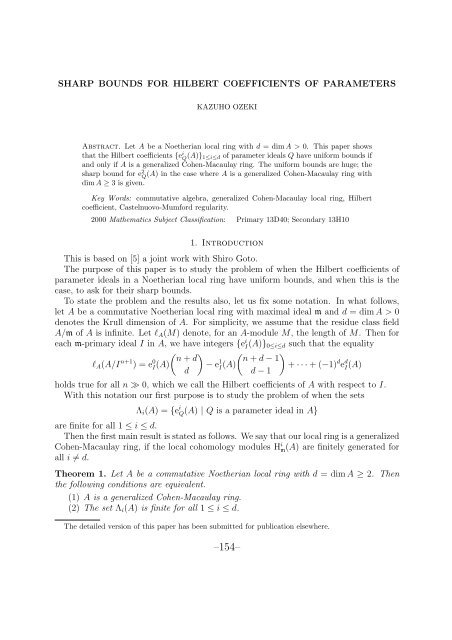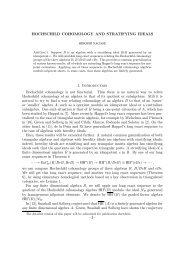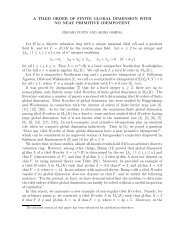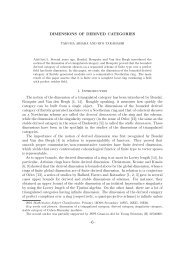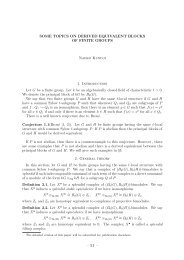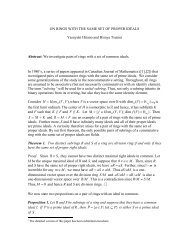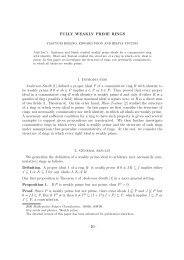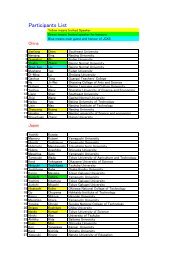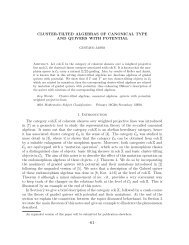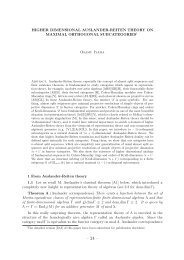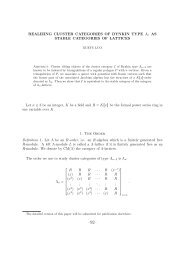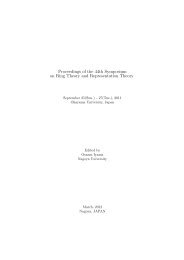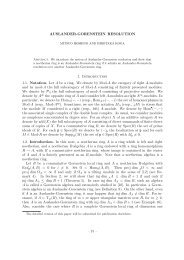Proceedings of the 44th Symposium on Ring Theory and ...
Proceedings of the 44th Symposium on Ring Theory and ...
Proceedings of the 44th Symposium on Ring Theory and ...
You also want an ePaper? Increase the reach of your titles
YUMPU automatically turns print PDFs into web optimized ePapers that Google loves.
SHARP BOUNDS FOR HILBERT COEFFICIENTS OF PARAMETERS<br />
KAZUHO OZEKI<br />
Abstract. Let A be a Noe<str<strong>on</strong>g>the</str<strong>on</strong>g>rian local ring with d = dim A > 0. This paper shows<br />
that <str<strong>on</strong>g>the</str<strong>on</strong>g> Hilbert coefficients {e i Q (A)} 1≤i≤d <str<strong>on</strong>g>of</str<strong>on</strong>g> parameter ideals Q have uniform bounds if<br />
<strong>and</strong> <strong>on</strong>ly if A is a generalized Cohen-Macaulay ring. The uniform bounds are huge; <str<strong>on</strong>g>the</str<strong>on</strong>g><br />
sharp bound for e 2 Q (A) in <str<strong>on</strong>g>the</str<strong>on</strong>g> case where A is a generalized Cohen-Macaulay ring with<br />
dim A ≥ 3 is given.<br />
Key Words: commutative algebra, generalized Cohen-Macaulay local ring, Hilbert<br />
coefficient, Castelnuovo-Mumford regularity.<br />
2000 Ma<str<strong>on</strong>g>the</str<strong>on</strong>g>matics Subject Classificati<strong>on</strong>: Primary 13D40; Sec<strong>on</strong>dary 13H10<br />
1. Introducti<strong>on</strong><br />
This is based <strong>on</strong> [5] a joint work with Shiro Goto.<br />
The purpose <str<strong>on</strong>g>of</str<strong>on</strong>g> this paper is to study <str<strong>on</strong>g>the</str<strong>on</strong>g> problem <str<strong>on</strong>g>of</str<strong>on</strong>g> when <str<strong>on</strong>g>the</str<strong>on</strong>g> Hilbert coefficients <str<strong>on</strong>g>of</str<strong>on</strong>g><br />
parameter ideals in a Noe<str<strong>on</strong>g>the</str<strong>on</strong>g>rian local ring have uniform bounds, <strong>and</strong> when this is <str<strong>on</strong>g>the</str<strong>on</strong>g><br />
case, to ask for <str<strong>on</strong>g>the</str<strong>on</strong>g>ir sharp bounds.<br />
To state <str<strong>on</strong>g>the</str<strong>on</strong>g> problem <strong>and</strong> <str<strong>on</strong>g>the</str<strong>on</strong>g> results also, let us fix some notati<strong>on</strong>. In what follows,<br />
let A be a commutative Noe<str<strong>on</strong>g>the</str<strong>on</strong>g>rian local ring with maximal ideal m <strong>and</strong> d = dim A > 0<br />
denotes <str<strong>on</strong>g>the</str<strong>on</strong>g> Krull dimensi<strong>on</strong> <str<strong>on</strong>g>of</str<strong>on</strong>g> A. For simplicity, we assume that <str<strong>on</strong>g>the</str<strong>on</strong>g> residue class field<br />
A/m <str<strong>on</strong>g>of</str<strong>on</strong>g> A is infinite. Let l A (M) denote, for an A-module M, <str<strong>on</strong>g>the</str<strong>on</strong>g> length <str<strong>on</strong>g>of</str<strong>on</strong>g> M. Then for<br />
each m-primary ideal I in A, we have integers {e i I (A)} 0≤i≤d such that <str<strong>on</strong>g>the</str<strong>on</strong>g> equality<br />
( ) ( )<br />
n + d<br />
n + d − 1<br />
l A (A/I n+1 ) = e 0 I(A) − e 1<br />
d<br />
I(A)<br />
+ · · · + (−1) d e d<br />
d − 1<br />
I(A)<br />
holds true for all n ≫ 0, which we call <str<strong>on</strong>g>the</str<strong>on</strong>g> Hilbert coefficients <str<strong>on</strong>g>of</str<strong>on</strong>g> A with respect to I.<br />
With this notati<strong>on</strong> our first purpose is to study <str<strong>on</strong>g>the</str<strong>on</strong>g> problem <str<strong>on</strong>g>of</str<strong>on</strong>g> when <str<strong>on</strong>g>the</str<strong>on</strong>g> sets<br />
Λ i (A) = {e i Q(A) | Q is a parameter ideal in A}<br />
are finite for all 1 ≤ i ≤ d.<br />
Then <str<strong>on</strong>g>the</str<strong>on</strong>g> first main result is stated as follows. We say that our local ring is a generalized<br />
Cohen-Macaulay ring, if <str<strong>on</strong>g>the</str<strong>on</strong>g> local cohomology modules H i m(A) are finitely generated for<br />
all i ≠ d.<br />
Theorem 1. Let A be a commutative Noe<str<strong>on</strong>g>the</str<strong>on</strong>g>rian local ring with d = dim A ≥ 2. Then<br />
<str<strong>on</strong>g>the</str<strong>on</strong>g> following c<strong>on</strong>diti<strong>on</strong>s are equivalent.<br />
(1) A is a generalized Cohen-Macaulay ring.<br />
(2) The set Λ i (A) is finite for all 1 ≤ i ≤ d.<br />
The detailed versi<strong>on</strong> <str<strong>on</strong>g>of</str<strong>on</strong>g> this paper has been submitted for publicati<strong>on</strong> elsewhere.<br />
–154–


